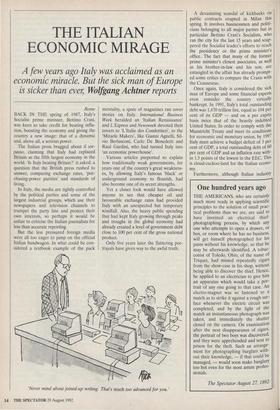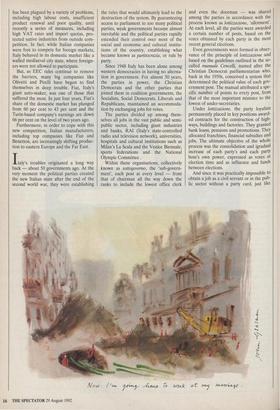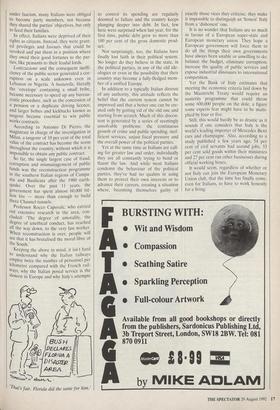THE ITALIAN ECONOMIC MIRAGE
A few years ago Italy was acclaimed as an economic miracle. But the sick man of Europe
is sicker than ever; Wolfgang Achtner reports Rome BACK IN THE spring of 1987, Italy's Socialist prime minister, Bettino Craxi, was keen to take credit for beating infla- tion, boosting the economy and giving the country a new image: that of a dynamic and, above all, a serious power.
The Italian press bragged about it sor- passo, claiming that Italy had replaced Britain as the fifth largest economy in the world. 'Is Italy beating Britain?' it asked, a question that the British press rushed to answer, comparing exchange rates, 'pur- chasing-power parities' and standards of living.
In Italy, the media are tightly controlled by the political parties and some of the largest industrial groups, which use their newspapers and television channels to trumpet the party line and protect their own interests, so perhaps it would be unfair to criticise the Italian journalists for less than accurate reporting.
But the less pressured foreign media were all too eager to jump on the official Italian bandwagon. In what could be con- sidered a textbook example of the pack
mentality, a spate of magazines ran cover stories on Italy. International Business Week heralded an 'Italian Renaissance' and L'Express and Newsweek devoted their covers to `L'Italie des Condottieri', to the `Miracle Makers', like Gianni Agnelli, Sil- vio Berlusconi, Carlo De Benedetti and Raul Gardini, who had turned Italy into `an economic powerhouse'.
Various articles purported to explain how traditionally weak governments, for years one of the country's great weakness- es, by allowing Italy's famous 'black' or underground economy to flourish, had also become one of its secret strengths.
Yet a closer look would have allowed anyone to see that cheaper oil and favourable exchange rates had provided Italy with an unexpected but temporary windfall. Also, the heavy public spending that had kept Italy growing through peaks and troughs in the global economy had already created a level of government debt close to 100 per cent of the gross national product.
Only five years later the flattering por- trayals have given way to the awful truth.
`Never mind about joined-up writing. That's much too advanced for you.'
A devastating scandal of kickbacks on public contracts erupted in Milan this spring. It involves businessmen and politi- cians belonging to all major parties but in particular Bettino Craxi's Socialists, who ran the city for the last 15 years and scup- pered the Socialist leader's efforts to reach the presidency or the prime minister's office. The fact that many of the former prime minister's closest associates, as well as his brother-in-law and his son, are entangled in the affair has already prtimpt- ed some critics to compare the Craxis with the Ceausescus.
Once again, Italy is considered the sick man of Europe and some financial experts even consider the country virtually bankrupt. In 1991, Italy's total outstanding debt was 1,470 trillion lire, equal to 104 per cent of its GDP — and on a per capita basis twice that of the heavily indebted United States. In order to comply with the Maastricht Treaty and meet its conditions for economic and monetary union, by 1997 Italy must achieve a budget deficit of 3 per cent of GDP, a total outstanding debt of 60 per cent of GDP and an inflation rate with- in 1.5 points of the lowest in the EEC. This is cloud-cuckoo-land for the Italian econo- my.
Furthermore, although Italian industry has been plagued by a variety of problems, including high labour costs, insufficient product renewal and poor quality, until recently a series of measures, including high VAT rates and import quotas, pro- tected native industries from outside com- petition. In fact, while Italian companies were free to compete for foreign markets, Italy behaved in its domestic market like a walled mediaeval city state, where foreign- ers were not allowed to participate.
But, as EEC rules continue to remove the barriers, many big companies like Olivetti and Pirelli have begun to find themselves in deep trouble. Fiat, Italy's giant auto-maker, was one of those that suffered the most. In just four years, Fiat's share of the domestic market has plunged from 60 per cent to 43 per cent and the Turin-based company's earnings are down 66 per cent on the level of two years ago.
Furthermore, in order to cope with this new competition, Italian manufacturers, including top companies like Fiat and Benetton, are increasingly shifting produc- tion to eastern Europe and the Far East.
Italy's troubles originated a long way back — about 50 governments ago. At the very moment the political parties created the new Italian state after the end of the second world war, they were establishing the rules that would ultimately lead to the destruction of the system. By guaranteeing access to parliament to too many political parties, weak governments became almost inevitable and the political parties rapidly extended their control over most of the social and economic and cultural institu- tions of the country, establishing .what became known as partitocrazia, or rule by party.
Since 1948 Italy has been alone among western democracies in having no alterna- tion in government. For almost 50 years, the parties in power, the Christian Democrats and the other parties that joined them in coalition governments, the Socialists, Social Democrats, Liberals and Republicans, maintained an accommoda- tion by exchanging jobs for votes.
The parties divided up among them- selves all jobs in the vast public and semi- public sector, including giant industries and banks, RAI (Italy's state-controlled radio and television network), universities, hospitals and cultural institutions such as Milan's La Scala and the Venice Biennale, sports federations and the National Olympic Committee .
Within these organisations, collectively known as sottogovemo, the 'sub-govern- ment', each post at every level — from that of chairman all the way down the ranks to include the lowest office clerk and even the doorman — was shared among the parties in accordance with the process known as lottizzazione, 'allotment'. At each level, all the parties were awarded a certain number of posts, based on the votes obtained by each party in the most recent general elections.
Even governments were formed in obser- vance of the principle of lottizzazione and based on the guidelines outlined in the so- called manuale Cencelli, named after the Christian Democrat parliamentarian who, back in the 1950s, conceived a system that determined the political value of each gov- ernment post. The manual attributed a spe- cific number of points to every post, from that of the most important minister to the lowest of under-secretaries.
Under lottizzazione, the party loyalists permanently placed in key positions award- ed contracts for the construction of high- ways, buildings and factories. They granted bank loans, pensions and promotions. They allocated franchises, financial subsidies and jobs. The ultimate objective of the whole process was the consolidation and igradual increase of each party's and each party boss's own power, expressed as votes at election time and as influence and funds between elections.
And since it was practically impossible to obtain a job as a civil servant or in the pub- lic sector without a party card, just like under fascism, many Italians were obliged to become party members, not because they shared the parties' objectives, but only to feed their families.
In effect, Italians were deprived of their rights as citizens. Instead, they were grant- ed privileges and favours that could be revoked and put them in a position where they owed their good fortunes to the par- ties, like peasants to their feudal lords.
Lottizzazione and the consequent ineffi- ciency of the public sector generated a cor- ruption on a scale unknown even in Lebanon or Nigeria. A bustarella, literally the 'envelope' containing a small bribe, became necessary to speed up any bureau- cratic procedure, such as the concession of a pension or a duplicate driving licence, and larger bribes and kickbacks known as tangenti became essential to win public works contracts.
According to Antonio Di Pietro, the magistrate in charge of the investigation in Milan, a tangente of 10 per cent of the total value of the contract has become the norm throughout the country, without which it is Impossible to obtain any public contract. So far, the single largest case of fraud, corruption and mismanagement of public funds was the reconstruction programme In the southern Italian regions of Campa- nia and Basilicata after the 1980 earth- quake. Over the past 11 years, the government has spent almost 60,000 bil- lion lire — more than enough to build three Channel tunnels.
Professor Rocco Caporale, who carried out extensive research in the area, con- cluded: 'The degree of amorality, the degree of unethical conduct, has reached all the way down, to the very last worker. When reconstruction is over, people will see that it has brutalised the moral fibre of the South.'
Keeping the above in mind, it isn't hard to understand why the Italian railways employ twice the number of personnel per kilometre compared with the French rail- ways, why the Italian postal service is the slowest in Europe and why Italy's attempts `That's fair. Florida did the same for him.' to control its spending are regularly doomed to failure and the country keeps plunging deeper into debt. In fact, few here were surprised when last year, for the first time, public debt grew to more than 100 per cent of the gross domestic prod- uct.
Not surprisingly, too, the Italians have finally lost faith in their political system. No longer do they believe in the state, in the political parties, in any of the old ide- ologies or even in the possibility that their country may become a fully-fledged mem- ber of a unified Europe.
In addition to a typically Italian distrust of any authority, this attitude reflects the belief that the current system cannot be improved and that a better one can be cre- ated only by getting rid of the old one and starting from scratch. Much of this discon- tent is generated by a series of seemingly unsolvable problems: the continuous growth of crime and public spending, inef- ficient services, unjust fiscal pressure and the overall power of the political parties.
Yet at the same time as Italians are call- ing for greater law and order, individually they are all constantly trying to bend or flaunt the law. And while most Italians condemn the behaviour of the political parties, they've had no qualms in using them to protect their own interests or to advance their careers, creating a situation where, becoming themselves guilty of exactly those vices they criticise, they make it impossible to distinguish an 'honest' Italy from a 'dishonest' one.
It is no wonder that Italians are so much in favour of a European super-state and European monetary union. They hope a European government will force them to do all the things their own governments have always been unable or unwilling to do: balance the budget, eliminate corruption, increase the quality of public services and expose industrial dinosaurs to international competition.
Yet the Bank of Italy estimates that meeting the economic criteria laid down by the Maastricht Treaty would require an austerity programme that could throw some 600,000 people on the dole, a figure some experts fear might have to be multi- plied by four or five.
Still, this would hardly be as drastic as it sounds if one considers that Italy is the world's leading importer of Mercedes Benz cars and champagne. Also, according to a study published a few years ago, 54 per cent of civil servants had second jobs, 33 per cent sold goods within their ministries and 27 per cent ran other businesses during official working hours.
It would seem, regardless of whether or not Italy can join the European Monetary Union club, that the time has finally come, even for Italians, to have to work honestly for a living.




















































 Previous page
Previous page